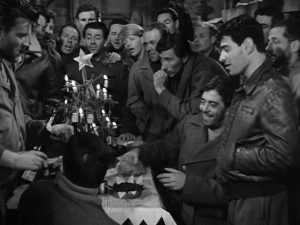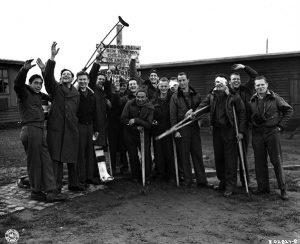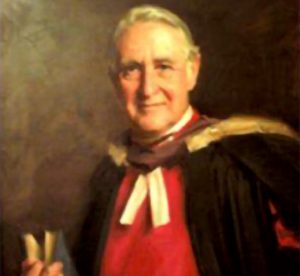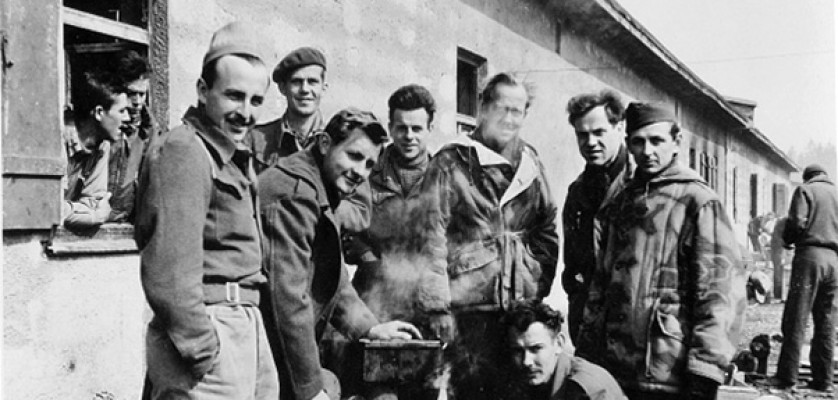by Bob Alvis, special to Aerotech News
David Read spent a couple of Christmases in a German POW camp in Bavaria during World War II.
As the camp’s pastor, he had a tough job with morale and keeping hope alive amongst the prisoners. In 1944, conditions were about as bad as they had ever been and the hopeful talk of “Home by Christmas” was being replaced with the discouraging words of “Let’s not celebrate Christmas this year.”

While looking through a drawer some years later, Read found a torn and crumpled piece of paper, where he had written the opening lines to a poem at that camp in the winter of 1944. As he read the words, it took him right back to those desperate days when the men were desperately short of food and increasingly aware (though they never spoke about it) that they were in the hands of an unpredictable madman who was unlikely to let them go home in peace, whether at Christmas or any other time. And even though the sounds of Allied aircraft gave them hope for deliverance, they wondered if the pilots knew the difference between a Nazi headquarters and a POW camp, and if they would become victims of friendly fire.
The cynics in the camps were doing their best to spread the despair. Read had his work cut out for him to find a holiday message that would encourage the men to carry on. The opening lines of his unfinished poem had been the start of trying to find that message of hope.
As the men’s new slogan of “Let’s not celebrate Christmas this year” cast the pall of a holiday with no carols, no pageants, not even thoughts of astonishing recipes with which they concocted unbelievable imaginary Christmas puddings and feasts, David’s poem in response never got past the second line. He wrote:
“Let’s not celebrate
Christmas this year?
God, what a yelp
from Christian men!”
The point of the poem was simple and worth dwelling on, no matter what the circumstances. David Read got to thinking about Peter and Paul and the other apostles, writing of their confidence in the Gospel of Christ, but suggesting that there were occasions when they should just give in to despair. Can we imagine any writer of an epistle to these first Christians saying “I know you are going through a very rough time — so why not forget about celebrating “The Incarnation?” Paul reminded his friends at Philippi that he had known imprisonment, flogging, shipwreck, starvation and more, but he then launched into a written celebration of the Incarnation that still echoes in hearts and minds, even today.

Read recalled that even though the conditions at the camp were deplorable, they were at the time not in any special danger or deprivation that Christmas. When he wrote that opening to his poem, he was thinking of a fellow prisoner named Dietrich Bonhoeffer who, after months of trials and threats to his life, was in the hands of the Gestapo awaiting the scaffold which was being prepared for him. Read was inspired by the idea that he could not imagine Bonhoeffer writing one letter from his prison, telling his readers that this was no time for Christmas celebrations. His letters breathed a total confidence in his Savior.
Read felt that the conditions in the camp and the despair of all the prisoners should not be the thing that defined them. He pushed back, saying that the Gospel is no less true when circumstances are most terrible. He affirmed that if the men would soak themselves in that truth, they would never make excuses for their lack of desire to celebrate or accept any excuses their fellow prisoners could come up with. David’s words to his fellow prisoners were short and to the point when they gathered on that 1944 Christmas Eve — and no poem was necessary.
May Christmas joy be real and radiant for all of us — no matter what our circumstance is!
David Read was part of the greatest generation, and his story of caring for the souls of men shows just how amazing that generation was. When this story was playing out, he was on his second Christmas in a POW camp. He did not know at the time that he still had months remaining as a “guest” of the German army. Years later, when he would see a “come home for Christmas” church invitation, he would always rejoice in the deeper meaning that can sustain us “even in the very worst of circumstances.”

As a pastor, his experience on that cold Christmas in 1944 set him up for all the Christmases for the rest of his life. His message of salvation to those that came to hear him tell the Christmas story carried a special feeling, as he was qualified more than most, thanks to his war experience, to speak to the real gift of salvation, the true meaning of Christmas, and the promise of men of faith holding on to hope when times were bleak.
With that, I will just wish you all a heartfelt “Merry Christmas” and the hopes for a Happy New Year, as we face our own challenges here in 2020. I just want to add that generations before faced greater challenges then we have today and came out on the other side with a new and fresh outlook on life. We only need to look to them for our inspiration today and never forget it was their faith that carried them through.
Until next time, Bob out …










